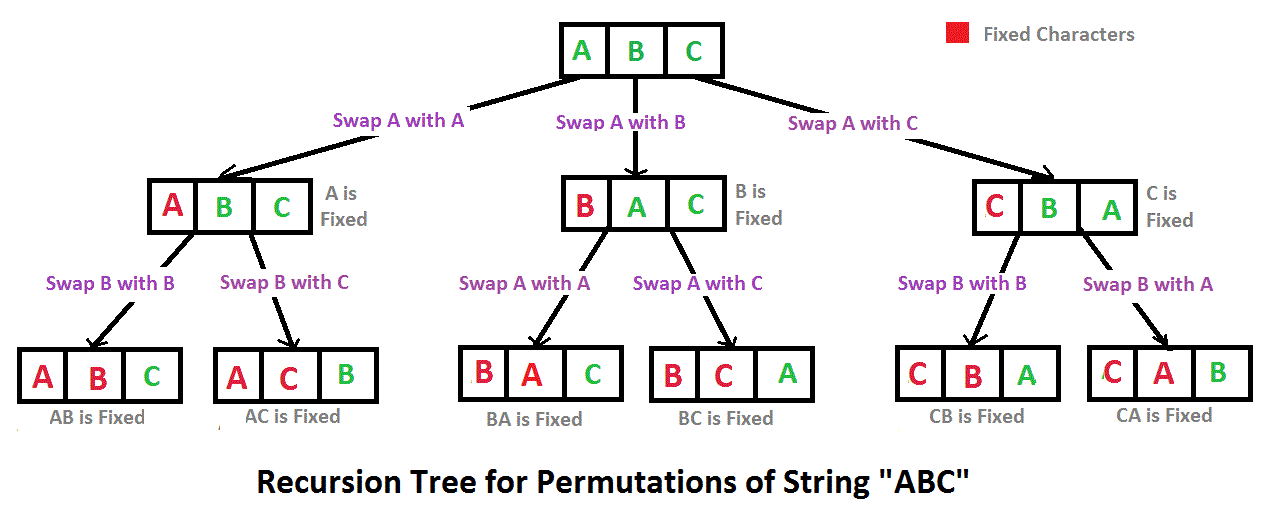Dados los números de vectores , la tarea es imprimir todas las permutaciones posibles del vector dado utilizando el retroceso .
Ejemplos :
Entrada : nums[] = {1, 2, 3}
Salida : {1, 2, 3}, {1, 3, 2}, {2, 1, 3}, {2, 3, 1}, {3, 2, 1}, {3, 1, 2}
Explicación : hay 6 permutaciones posiblesEntrada : nums[] = {1, 3}
Salida : {1, 3}, {3, 1}
Explicación : Hay 2 permutaciones posibles
Enfoque : La tarea se puede resolver con la ayuda de retroceder . Un artículo similar para una mejor comprensión está aquí: Imprimir todas las permutaciones de una string dada

A continuación se muestra la implementación del código anterior:
C++
// C++ program for the above approach
#include <bits/stdc++.h>
using namespace std;
// Function for swapping two numbers
void swap(int& x, int& y)
{
int temp = x;
x = y;
y = temp;
}
// Function to find the possible
// permutations
void permutations(vector<vector<int> >& res,
vector<int> nums, int l, int h)
{
// Base case
// Add the vector to result and return
if (l == h) {
res.push_back(nums);
return;
}
// Permutations made
for (int i = l; i <= h; i++) {
// Swapping
swap(nums[l], nums[i]);
// Calling permutations for
// next greater value of l
permutations(res, nums, l + 1, h);
// Backtracking
swap(nums[l], nums[i]);
}
}
// Function to get the permutations
vector<vector<int> > permute(vector<int>& nums)
{
// Declaring result variable
vector<vector<int> > res;
int x = nums.size() - 1;
// Calling permutations for the first
// time by passing l
// as 0 and h = nums.size()-1
permutations(res, nums, 0, x);
return res;
}
// Driver Code
int main()
{
vector<int> nums = { 1, 2, 3 };
vector<vector<int> > res = permute(nums);
// printing result
for (auto x : res) {
for (auto y : x) {
cout << y << " ";
}
cout << endl;
}
return 0;
}
Java
// Java program for the above approach
import java.util.ArrayList;
import java.util.Arrays;
public class GFG
{
// Function for swapping two numbers
static void swap(int nums[], int l, int i)
{
int temp = nums[l];
nums[l] = nums[i];
nums[i] = temp;
}
// Function to find the possible
// permutations
static void permutations(ArrayList<int[]> res,
int[] nums, int l, int h)
{
// Base case
// Add the array to result and return
if (l == h) {
res.add(Arrays.copyOf(nums, nums.length));
return;
}
// Permutations made
for (int i = l; i <= h; i++) {
// Swapping
swap(nums, l, i);
// Calling permutations for
// next greater value of l
permutations(res, nums, l + 1, h);
// Backtracking
swap(nums, l, i);
}
}
// Function to get the permutations
static ArrayList<int[]> permute(int[] nums)
{
// Declaring result variable
ArrayList<int[]> res = new ArrayList<int[]>();
int x = nums.length - 1;
// Calling permutations for the first
// time by passing l
// as 0 and h = nums.size()-1
permutations(res, nums, 0, x);
return res;
}
// Driver Code
public static void main(String[] args)
{
int[] nums = { 1, 2, 3 };
ArrayList<int[]> res = permute(nums);
// printing result
for (int[] x : res) {
for (int y : x) {
System.out.print(y + " ");
}
System.out.println();
}
}
}
// This code is contributed by jainlovely450
Python3
# Python program for the above approach
# Function to find the possible
# permutations
def permutations(res, nums, l, h) :
# Base case
# Add the vector to result and return
if (l == h) :
res.append(nums);
for i in range(len(nums)):
print(nums[i], end=' ');
print('')
return;
# Permutations made
for i in range(l, h + 1):
# Swapping
temp = nums[l];
nums[l] = nums[i];
nums[i] = temp;
# Calling permutations for
# next greater value of l
permutations(res, nums, l + 1, h);
# Backtracking
temp = nums[l];
nums[l] = nums[i];
nums[i] = temp;
# Function to get the permutations
def permute(nums):
# Declaring result variable
x = len(nums) - 1;
res = [];
# Calling permutations for the first
# time by passing l
# as 0 and h = nums.size()-1
permutations(res, nums, 0, x);
return res;
# Driver Code
nums = [ 1, 2, 3 ];
res = permute(nums);
# This code is contributed by Saurabh Jaiswal
Javascript
<script>
// JavaScript program for the above approach
// Function to find the possible
// permutations
function permutations(res, nums, l, h)
{
// Base case
// Add the vector to result and return
if (l == h)
{
res.push(nums);
for(let i = 0; i < nums.length; i++)
document.write(nums[i] + ' ');
document.write('<br>')
return;
}
// Permutations made
for(let i = l; i <= h; i++)
{
// Swapping
let temp = nums[l];
nums[l] = nums[i];
nums[i] = temp;
// Calling permutations for
// next greater value of l
permutations(res, nums, l + 1, h);
// Backtracking
temp = nums[l];
nums[l] = nums[i];
nums[i] = temp;
}
}
// Function to get the permutations
function permute(nums)
{
// Declaring result variable
let x = nums.length - 1;
let res = [];
// Calling permutations for the first
// time by passing l
// as 0 and h = nums.size()-1
permutations(res, nums, 0, x);
return res;
}
// Driver Code
let nums = [ 1, 2, 3 ];
let res = permute(nums);
// This code is contributed by Potta Lokesh
</script>
1 2 3 1 3 2 2 1 3 2 3 1 3 2 1 3 1 2
Complejidad de tiempo : O(N*N!) Tenga en cuenta que hay N! permutaciones y requiere tiempo O(N) para imprimir una permutación.
Espacio Auxiliar : O(r – l)
Publicación traducida automáticamente
Artículo escrito por harshalkhond y traducido por Barcelona Geeks. The original can be accessed here. Licence: CCBY-SA